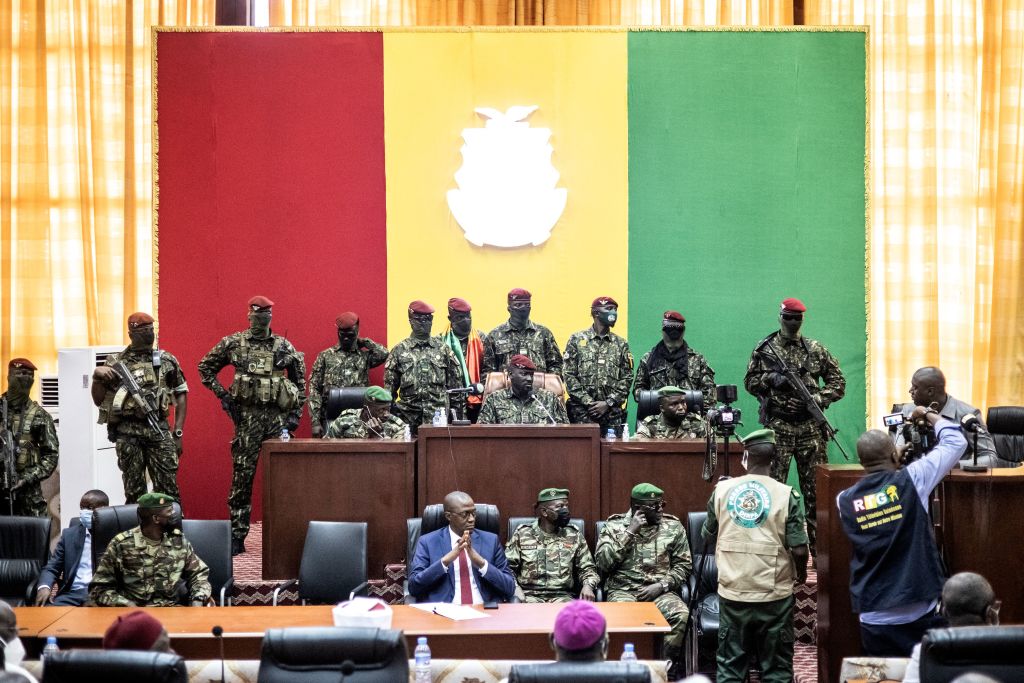
On 5 September, Guinea’s special forces took control of the country, detaining the president, Alpha Conde, and suspending the constitution. Citing endemic corruption, human rights abuses and poverty, coup leader Lieutenant Colonel Mamady Doumbouya
announced the next day that a new administration of ‘national union’ would be formed in the coming weeks.
During a scheduled press conference that day, a Chinese foreign ministry spokesperson said that
Beijing was closely following developments and that it opposed the military unit’s actions and called for the president’s ‘immediate release’. What’s striking is Beijing’s break with its posture of ‘non-interference’, issuing such strong statements on a country’s domestic politics. In Guinea’s particular case, however, there are good reasons for China to pay close attention to political developments there.
The first is the extent to which Guinea’s coup impacts China’s long-term strategy to diversify its iron ore suppliers. Part of that strategy has involved turning to Africa. With two of Beijing’s top 15 suppliers—South Africa and Mauritania—already in Africa, Chinese companies
are currently studying reserves in Algeria, Cameroon, Republic of Congo, Liberia, Senegal, Sierra Leone, Gabon, Nigeria and Madagascar.
However, Guinea is unique. A mineral-rich country, its 100-kilometre-long Simandou mountain range holds an
estimated 8.6 billion tonnes of iron ore graded at more than 65.5%, seen to be one of the world’s last untapped high-grade reserves. The Guinean government had leveraged Simandou’s potential for Chinese investment in a major 650-kilometre railway project, a deep-water port and related facilities as part of China’s Belt and Road Initiative.
Thus far, Beijing has been reluctant to bring Australian iron ore imports into its campaign of economic coercion against Australia, in which the beef, barley, lobsters and wine industries have been badly hit. While some analysts say
Guinea represents ‘one of the best medium- to long-term solutions to reduce dependency’ on Australian iron ore and others caution it’s
not big enough to free China from its reliance on Australian supply, Guinea’s reserves carry the potential to give Beijing some leverage.
Guinea’s potential still depends on a few factors. For one, it’s not clear that the coup leaders and interim administration will honour agreements signed with Chinese companies under the previous government. One such agreement, signed between the Conde administration and the SMB-Winning consortium in
June last year, allows the Chinese–Singaporean–Guinean group to acquire the mining rights to two blocks in the north of Simandou worth roughly $19 billion.
Plans to develop Simandou have
stalled over the past two decades due to corruption and fluctuating levels of interest, despite the involvement of a number of mining companies and investors (Rio Tinto was the first foreign investor given a licence to explore in 1997). If China is prepared to double down on Simandou, it will have to pay up to $20 billion over the next five years to develop the infrastructure and mine.
As one analyst noted, ‘in these tenuous times China appears ready to make that investment’.
Domestic factors in China like
cuts to steel production, restrictions on pollution and the
precarious financial situation of large property developers will also shape Chinese purchases of Australian iron ore. The coup adds greater uncertainty for now to Beijing’s plans.
In addition to iron ore, China is also worrying about disruption to its supply of aluminium. As the world’s second largest supplier of bauxite, Guinea meets 55% of
China’s demand for it. With fears that the political turmoil could disrupt supply, the price of aluminium hit a
10-year high on the day after the coup. For now, mining companies are exempt from Guinea’s nationwide curfew; however, the status of operations on the ground remains unclear. Some operators said
it was business as usual, while other companies did not confirm. If that situation changes, Canberra and Jakarta could benefit. Together with Guinea, Australia and Indonesia comprise 99% of China’s bauxite purchases.
With those key commodities in mind, there are legitimate concerns in China about Guinea’s future economic and political stability. While there has so far been no resistance from other army units, including the presidential guard, risks remain. A Chinese official with the economic and commercial office of the Chinese embassy in Guinea
warned of several factors including a general economic slowdown. While Conde’s removal has been celebrated by some Guineans, if coup leaders are unable to satisfy both his supporters and opposition camps, the risk of public unrest remains. Violence erupted and 21 people
were killed after last year’s presidential election in October. Shops were closed, and internet and telephone networks
severely disrupted or shut down for a few days.
China has called for the president’s release, but that would do little to address the waning public confidence in Guinea’s political system. The country’s democracy was already under siege before the coup. Last year’s legislative election and constitutional referendum were postponed for two weeks after the Organisation internationale de la Francophonie, an organisation of French-speaking governments,
raised concerns about 2.49 million ‘problematic’ entries on the electoral roll.
But Guinean public support for the ousting of the president should not be thought of as support for military rule. Memories of brutal periods of military intervention run deep. In September 2009, soldiers killed 157 unarmed coup protesters in a stadium,
leaving 1,253 wounded, with
109 women raped or sexually abused.
Chinese state media network CGTN
aired the statement of a Guinean government spokesperson who was ‘worried’ about bilateral ties with China, calling on ‘everybody to work together to save this cooperation’, particularly on current and future projects. And yet, despite its massive and concerted investment in infrastructure, emerging markets and even peacekeeping across the African continent, it seems there are few levers Beijing can pull in order to substantially influence political and military actors on the ground. Despite being ‘all in’ on Conde as a means of
guaranteeing access to commodities, Beijing will have to invest anew in keeping Guinea’s new powerbrokers on side.
 Print This Post
Print This Post